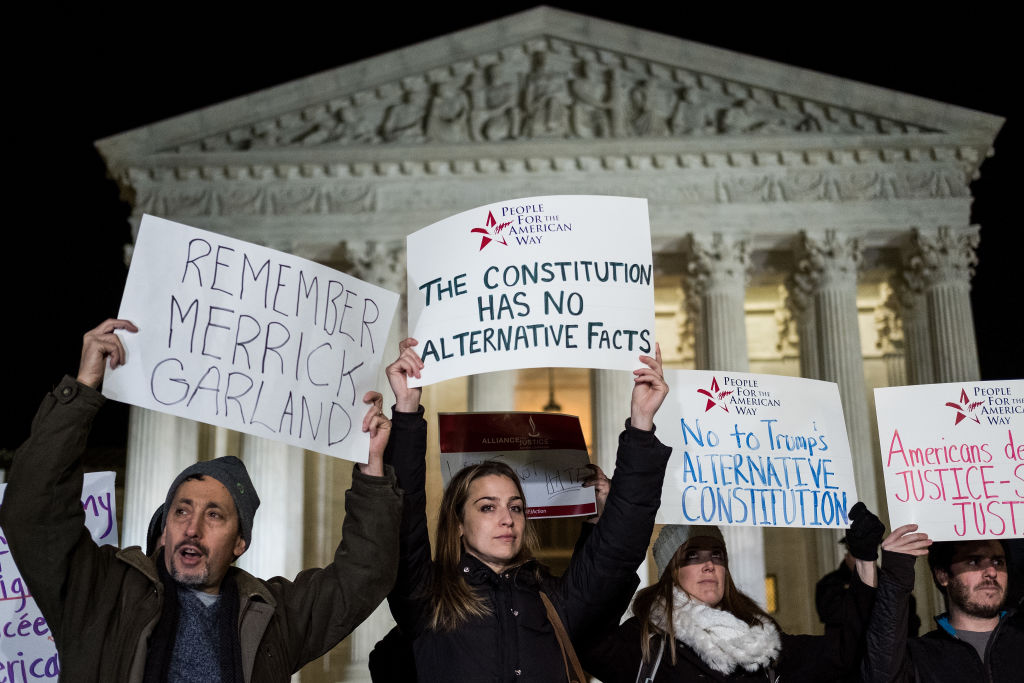Why moderate Democrats might risk killing the filibuster to block Neil Gorsuch
Two words: Merrick Garland


On Tuesday night, in a reality TV–flavored unveiling ceremony, President Trump handed the red judicial rose (figuratively speaking) to federal appellate Judge Neil Gorsuch, his choice to fill the Supreme Court seat vacated last year with the death of Justice Antonin Scalia.
Gorsuch, 49, has all the right credentials for the job — Columbia and Harvard Law, a mother who worked in the Reagan administration, a Supreme Court clerkship under his belt, and a seat on the U.S. 10th Circuit Court of Appeals in Colorado. He's a born Westerner and a Protestant vying for a seat on a high court full of coastal Catholic and Jewish jurists. Democratic leaders are voicing their opposition to Gorsuch by noting his conservative ideology and conservative judicial opinions, while Republicans, even those leery of Trump, are celebrating the nomination for the same reason — this is why many of them reluctantly backed Trump.
But while the Democratic base and Sanderista liberals are on the verge of mutiny at the lack of fire and brimstone from Democrats in Congress, Republicans hold a 52-48 vote advantage in the Senate. The only thing standing in the way of Gorsuch replacing Scalia on the Supreme Court (ideologically as well as physically) is the filibuster.
The Week
Escape your echo chamber. Get the facts behind the news, plus analysis from multiple perspectives.

Sign up for The Week's Free Newsletters
From our morning news briefing to a weekly Good News Newsletter, get the best of The Week delivered directly to your inbox.
From our morning news briefing to a weekly Good News Newsletter, get the best of The Week delivered directly to your inbox.
Democrats have threatened to block Gorsuch because Senate Republicans brazenly refused to even hold a hearing for the nominee President Barack Obama put forth almost a year ago, Merrick Garland, and Senate Majority Leader Mitch McConnell has threatened to push Trump's nominee through using whatever means necessary — in other words, killing the filibuster for Supreme Court nominees. Some Democrats are balking, telling CNN that it might be better to preserve the filibuster for the next Supreme Court fight, especially if a liberal seat is on the line.
A filibuster requires 41 of 48 Senate Democrats and allied independents putting their feet down. Believing the filibuster will survive the next battle requires trusting McConnell. It isn't just the progressive left that thinks that's a fool's errand.
Jonathan Chait, nobody's idea of a hard-lefty, argues that trying to save the filibuster for the next nominee is "fantastical" and pointless. "There is no 'leverage' gained by a weapon one's opponent can disarm at will," he writes at New York. In negating Garland's nomination, Republicans have changed the rules of politics completely, and now "a president needs 50 Senate votes to fill a seat, or it will go unfilled." That's bad for democracy, but it's the new reality, he writes, and "Democrats have an extremely simple choice. They can make McConnell abolish the filibuster, or wait for the day when McConnell attacks them for doing it. It is McConnell, [and] his extraordinary blockade tactic, who has functionally changed the rules of the game. He should be forced to do it in name."
David Leonhardt at The New York Times is on the same page, calling the Garland snub "a raw power grab" — albeit a successful one — and noting that Republicans hinted before the election "that no Hillary Clinton nominee would be confirmed, either." Democrats can't stop Gorsuch if McConnell goes nuclear, but they at least "need to make sure that the stolen Supreme Court seat remains at the top of the public's consciousness," he writes. "When people hear the name 'Neil Gorsuch,' as qualified as he may be, they should associate him with a constitutionally damaging power grab." Leonhardt continues:
A free daily email with the biggest news stories of the day – and the best features from TheWeek.com
Democrats should not weigh this nomination the same way that they've weighed previous ones. This one is different. The presumption should be that Gorsuch does not deserve confirmation, because the process that led to his nomination was illegitimate.... I understand that all of these options sound aggressive and partisan. But Democrats simply cannot play by the old set of rules now that the Republicans are playing by a new one. The only thing worse than the system that the Republicans have created is a system in which one political party volunteers to be bullied. [The New York Times]
Whether you agree with him or not, Gorsuch is a qualified and respectable candidate for Supreme Court justice. But so was Merrick Garland — Republicans never really disputed that. In fact, in 2002, Gorsuch called Garland and John Roberts, now the chief justice, "among the finest lawyers of their generation" and chastised the Senate for denying them votes for purely political reasons.
Don't be surprised if, in Gorsuch's confirmation hearings, a lot of irked Democrats ask some form of the following question: "Judge Gorsuch, given your fealty to constitutional originalism and your past statements, do you believe Judge Garland should have received a confirmation vote for the seat you now aspire to fill on the Supreme Court?" Whatever his answer, that should at least make for good reality TV.
Peter has worked as a news and culture writer and editor at The Week since the site's launch in 2008. He covers politics, world affairs, religion and cultural currents. His journalism career began as a copy editor at a financial newswire and has included editorial positions at The New York Times Magazine, Facts on File, and Oregon State University.
-
 Political cartoons for January 4
Political cartoons for January 4Cartoons Sunday's political cartoons include a resolution to learn a new language, and new names in Hades and on battleships
-
 The ultimate films of 2025 by genre
The ultimate films of 2025 by genreThe Week Recommends From comedies to thrillers, documentaries to animations, 2025 featured some unforgettable film moments
-
 Political cartoons for January 3
Political cartoons for January 3Cartoons Saturday's political cartoons include citizen journalists, self-reflective AI, and Donald Trump's transparency
-
 Bari Weiss’ ‘60 Minutes’ scandal is about more than one report
Bari Weiss’ ‘60 Minutes’ scandal is about more than one reportIN THE SPOTLIGHT By blocking an approved segment on a controversial prison holding US deportees in El Salvador, the editor-in-chief of CBS News has become the main story
-
 Has Zohran Mamdani shown the Democrats how to win again?
Has Zohran Mamdani shown the Democrats how to win again?Today’s Big Question New York City mayoral election touted as victory for left-wing populists but moderate centrist wins elsewhere present more complex path for Democratic Party
-
 Millions turn out for anti-Trump ‘No Kings’ rallies
Millions turn out for anti-Trump ‘No Kings’ ralliesSpeed Read An estimated 7 million people participated, 2 million more than at the first ‘No Kings’ protest in June
-
 Ghislaine Maxwell: angling for a Trump pardon
Ghislaine Maxwell: angling for a Trump pardonTalking Point Convicted sex trafficker's testimony could shed new light on president's links to Jeffrey Epstein
-
 The last words and final moments of 40 presidents
The last words and final moments of 40 presidentsThe Explainer Some are eloquent quotes worthy of the holders of the highest office in the nation, and others... aren't
-
 The JFK files: the truth at last?
The JFK files: the truth at last?In The Spotlight More than 64,000 previously classified documents relating the 1963 assassination of John F. Kennedy have been released by the Trump administration
-
 'Seriously, not literally': how should the world take Donald Trump?
'Seriously, not literally': how should the world take Donald Trump?Today's big question White House rhetoric and reality look likely to become increasingly blurred
-
 Will Trump's 'madman' strategy pay off?
Will Trump's 'madman' strategy pay off?Today's Big Question Incoming US president likes to seem unpredictable but, this time round, world leaders could be wise to his playbook
